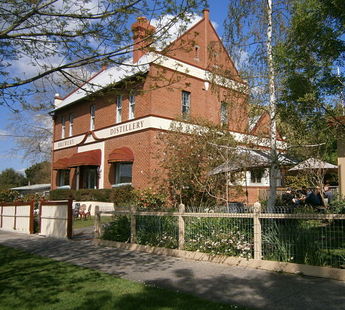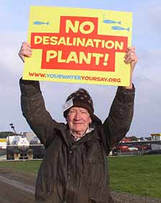WE CAME to live in Jeetho West, on the outskirts of Loch, in 2007 as the Loch–Bena bypass was being completed. Hard to imagine now all that highway traffic flowing through this quiet and gentle village. Of course there have been changes in Loch over those past years, some for the better, some not so.
During these short years, the Post Office has gone and the Royal Hotel, better known as Syb’s place, has closed. How we miss that good food and weekend entertainment. The famous Quilting Barn is smaller now, and in our time the general store has changed hands four times and is currently closed.
The old Union Bank, now the Loch Distillery.
Yet Loch has a staunch heart. It picks itself up and moves on. Gift and antique shops attract weekend visitors, good coffee is to be found in its several cafes, the popular Cosy Cafe has taken over the mail service. The Gilded Lily Restaurant in its intimate setting is keeping us guessing as to its future and there is talk that the new owner of the old post office building may soon open it as a gallery.
Standing at the eastern end of town is the old Union Bank building. I doubt if you would miss it as you drive through to rejoin the highway but the adjoining old butcher shop nestling in its shadow could go unnoticed. This would be a pity for today they are brothers in arms.
The Loch Brewery and Distillery now occupy the premises. The distillery stands where deposits and withdrawals were once conducted and the brewing of old style English beer takes place where locals in bygone years bought their joint for the weekend roast.
The hand-beaten copper distillers are a feature of the bar.
The stainless steel beer brewing vats were made by a Leongatha company experienced in manufacturing milk vats.
Heat extracts the sugars from the malt in a timber-encased vat before the beer is transferred to the uninsulated cool tank to finish brewing.This is the dream and long-held ambition that has become a reality for owners Craig Johnson and his partner Melinda Davies and they are well equipped for their new enterprise.
Craig has spent many years in Melbourne as operations manager for a large trucking firm and Mel has experience in sales and marketing. Mel is third generation of Tarwin Lower heritage so in a sense she has returned to her homeland.
After months of searching Craig still seems knocked out by their good fortune at finding the old bank, which so perfectly fits their needs.
“Had we settled for a suitable building out of a town we would have had to provide food and coffee, something we did not wish to do. Here, situated in the village, we can concentrate on what we do best.”
He says he has crawled all over the bank from vault to roof top and is amazed at the craftsmanship that has gone into its design and structural strength. The walls are six bricks in thickness.
Craig has honed his skills as a brewer over the years and spent some time in the UK visiting similar-sized breweries and brewery manufactures.
“We sourced as much of the equipment as we could from local suppliers. C&L Stainless of Leongatha made all beer brewing vats to our specifications using their vast experience in manufacturing for the dairy industry.”
The copper distillery equipment was not available locally so was shipped out from England. All three copper distillers were hand beaten in Portugal.
The old butcher shop with its insulated walls and concrete floor seems as if purpose-built for a brewery. It has the stark look of an operating theatre, with stainless steel tanks and complex plumbing, but the sweet smells of yeasts and malts rapidly override first impressions. This is where the magic happens.
“The brewing takes only a day” says Craig, “but the fermenting and conditioning takes between 4 to 6 weeks before the beer is ready for drinking. The beer is completely natural without being filtered or pasteurised and is naturally carbonated by secondary bottle fermentation. All the grain we use is milled in a small electric roller made in Melbourne.”
I ask why one of the vats is encased in timber and am told that this is where the brewing takes place. Here heat is used to extract the sugars from the malt prior to the brew being transferred to the uninsulated cool tank.
We walk over to the distillery in the old bank building . distillers make a warm and interesting display in the bar. They remind me of scenes from Dr Who with their strange bulbous shapes and complex pipes and taps. They range from 100 litres to 10 litres in volume and Craig tells me they have the capacity to produce 90 litres of spirits at a time. He brings over a sample of whisky in a small bottle which is as clear as mountain stream water. The aroma is delicious.
“Whisky takes its colour from the oak casks “ he says. ”This sample is unoaked.”
It is obvious that the production of single malt whisky is the first love. Gin has already been made but waits for the delivery of suitable bottles. Their whisky is a work in progress.
Returning on a sunny Grand Final Saturday to take some photos I find the bar and garden are peopled with wiser folk who will spend the day in these idyllic surroundings sharing with friends a glass or two of boutique beer. I am sorely tempted to stay awhile.
Loch Brewery & Distillery , 44 Victoria Road, Loch, Phone 0414 590 474. Open Friday to Sunday, noon-5pm. Other times by appointment.
COMMENTS
October 4, 2014
Thanks Bob for an absolutely outstanding story, another great read. What a wonderful place Loch is and your story encapsulates its’ beauty very well.
Keep up the good work, can’t wait to read your next article.
Roger Clark, Grantville


 RSS Feed
RSS Feed